In this article, I’m going to answer the question: How long does it take to detox from alcohol?” Plus, I’ll discuss ways to reduce the duration and severity of alcohol withdrawal symptoms. For alcoholics, quitting drinking results in both physical and psychological alcohol withdrawal symptoms. These symptoms can lead to the resumption of drinking if they are not managed properly.
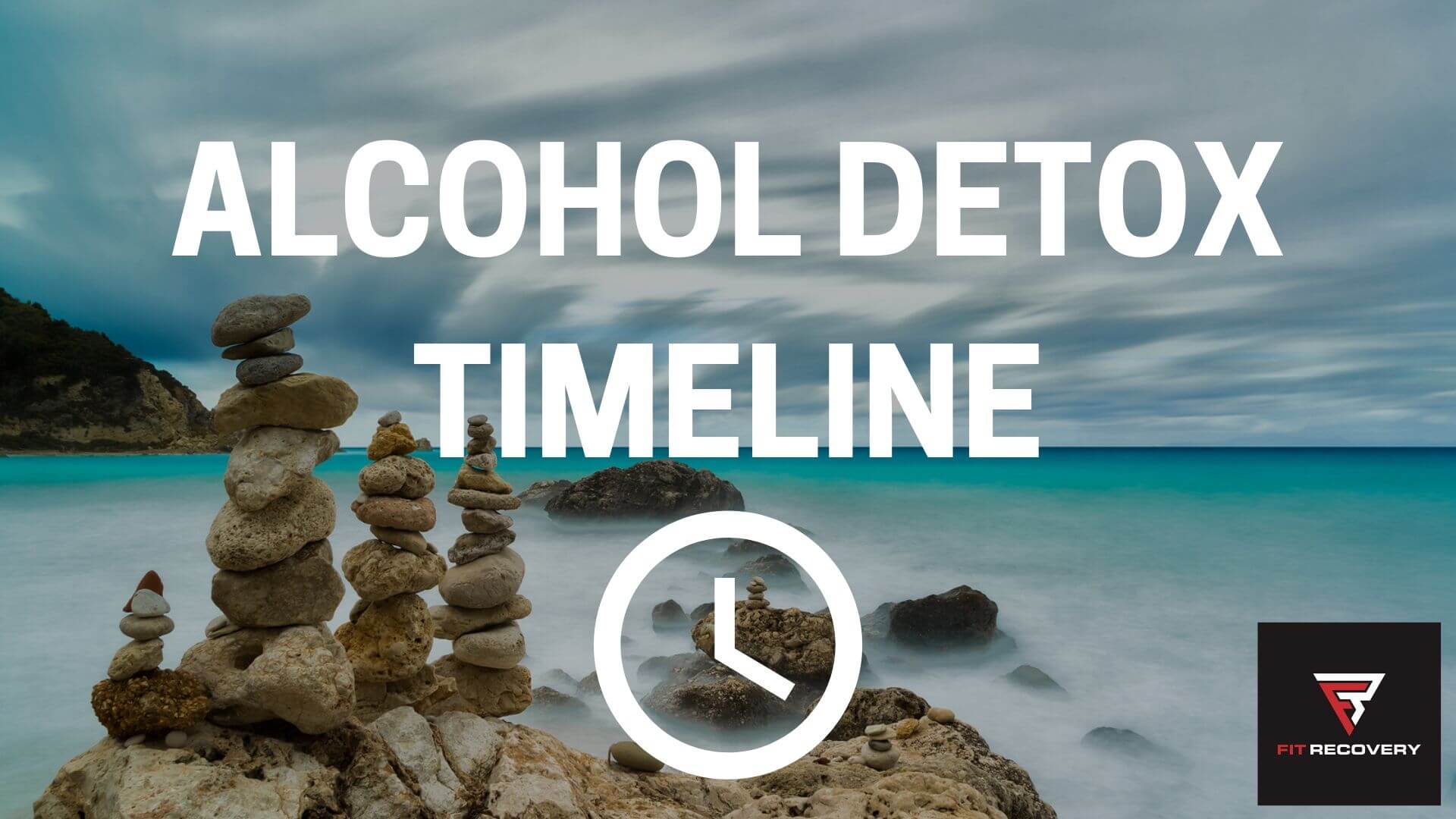
The duration of alcohol withdrawal symptoms depends on how much a person was drinking, the duration of addiction, and what (if any) detox methods or medications are used.
If your goal is to distinguish between mild, moderate, and severe withdrawal symptoms, then you will want to come back to this article after you read my last article on this subject.
Here I will draw upon my own experience to explore how long it takes to detox from alcohol in three different scenarios:
- Quitting cold turkey
- Weaning off of alcohol
- Medication taper and nutrient repair
We will also review the causes of withdrawal, the brain phenomenon known as kindling, and further resources for reducing the alcohol detox timeline.
Overview
Before we review different scenarios for detox, let’s get a few general points out of the way:
- Most alcoholics who quit drinking suddenly experience withdrawal symptoms within 24 hours.
- If you have symptoms of severe withdrawal like intense confusion or seizures, you should consult a doctor, who will likely prescribe anti-anxiety drugs that can save your life.
- I beat a VERY severe addiction and you can do it too! Never get hung up on the gloomy relapse statistics.
Symptoms of withdrawal, listed from relatively minor to severe, include:
- A general sense of unease
- Fatigue
- Insomnia
- Shakiness
- Depression
- Increased blood pressure
- Sense of impending doom
- Hypersensitive reflex responses
- High fever
- Full body twitching
- Brain zaps
- Auditory, visual, or tactile hallucinations
- Delirium Tremens – confusion/hallucinations that can last up to a week (untreated)
The following chart is a general snapshot (in days) of the withdrawal timeline for a person who quits cold turkey without medications.
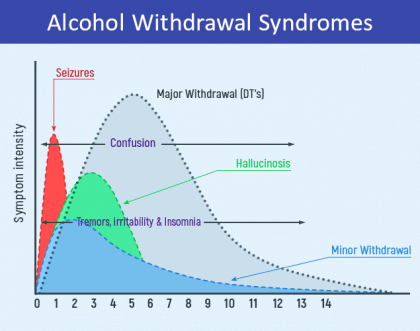
The red, green, and gray areas only apply to severe withdrawal, while the blue area applies to minor withdrawal.
The chart above only deals with the physical symptoms of acute alcohol withdrawal.
For most alcoholics who quit drinking, life does not return to normal after two weeks without alcohol. There are two other factors that have to be taken into account here:
- Post-Acute Withdrawal Syndrome (PAWS): Consists of physical and psychological symptoms – often anxiety, depression, and insomnia – that can last for up to a year after quitting drinking.
- Resolution of Underlying Disorders: A large percentage of alcoholics have untreated anxiety, depression, insomnia or other psychological issues that need to be addressed – often by a combination of nutrient restoration, external support, and the formation of new belief systems. Some people may need therapy or medications.
Regardless of the severity of your addiction, you have the power to minimize the symptoms in the above chart! The withdrawal remedies, nutrient repair supplements, and lifestyle changes discussed on this site can help you quit with relative ease and stay off for good.
Being proactive about your healing process can shorten how long it will take you to get off from alcohol. We will now review three different scenarios. While it’s been more than a few years since I quit drinking for good, I experienced all of these scenarios during the decade in which I oscillated between dry periods and progressively heavier drinking.
1. Quitting Cold Turkey
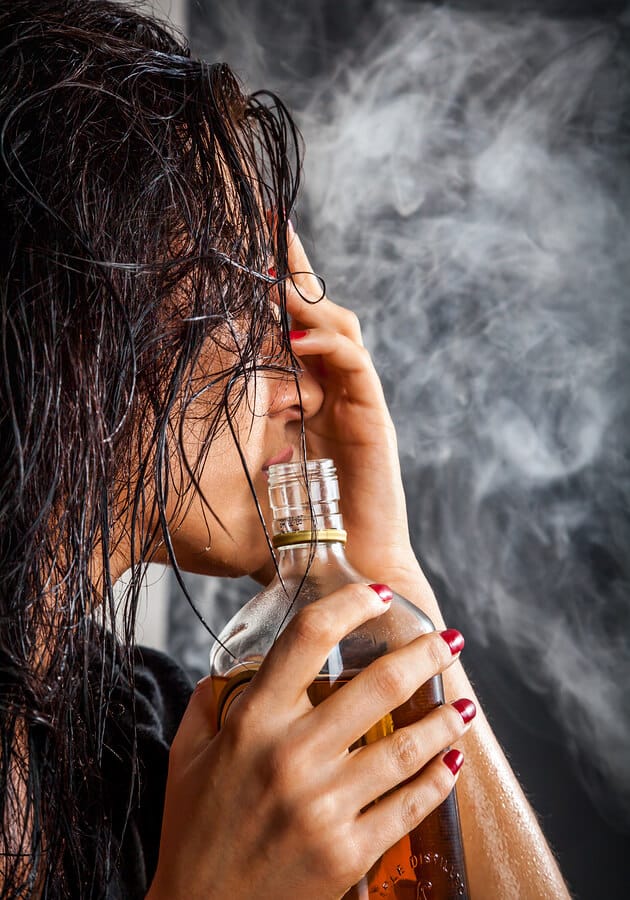
This is the longest duration and unfortunately the most common scenario.
Quitting cold turkey is a bad idea for reasons that will be fully explained in the sections below. In short, your brain chemicals have become dependent for normal functioning, and quitting cold turkey dangerously throws your neurotransmitters out of balance.
If you quit cold turkey, you may start to feel human again within 2 – 14 days, depending on the severity of your addiction.
However, quitting cold turkey increases the likelihood of potentially fatal seizures as well as ongoing psychological disturbances that can last for months.
The rare alcoholic who succeeds in quitting cold turkey is often left feeling shell-shocked, which is not helped by the fact that he or she is already conditioned to use booze to relieve stress.
Post-acute withdrawal syndrome for the cold-turkey-quitter who does not utilize medications or nutrient repair can last a very long time. I once succeeded in quitting cold turkey for about three weeks, but the untreated anxiety and anhedonia (inability to feel pleasure) finally got to me and I eagerly binged after being invited to a party.
As I later realized, I do not suffer from a serious underlying anxiety disorder. The anxiety I felt after quitting drinking cold turkey was entirely a result of PAWS.
Bottom Line: Don’t quit cold turkey unless you experience only mild withdrawal symptoms. If you’ve already succeeded in quitting this way, then kudos to you. Utilize this site to learn how to repair your brain and keep yourself on track!
2. Weaning Off Of Alcohol

A small percentage of people have been able to wean themselves off of tremendous quantities of alcohol and stay off for good. Weaning off of alcohol can be effective for avoiding acute withdrawal symptoms, and minimizing the “kindling” effect by which repeatedly traumatic withdrawal experiences become worse over time.
If you can wean off of alcohol, you may begin to feel a bit better as soon as your taper hits a few drinks per day or zero.
Unfortunately, most people who wean off eventually fall back into a pattern of heavy drinking. This happens for two reasons:
- Most people who wean off do not repair their biochemistry, and cannot figure out why they feel so down and lackluster even months after quitting drinking
- Most people who wean off do not replace their implicit belief in the necessity or desirability of drinking with new, empowering beliefs about their ability to feel good without it
Both of these points are a mouthful, but if you understand them, you’re lightyears ahead of the average alcohol-dependent person who wants to quit.
About a year before I quit drinking, I weaned myself down from over a fifth of hard liquor per day to 2 glasses of wine per night. This process took a few weeks. I was starting a new job and wanted to be mentally sharp.
It took an enormous amount of willpower to gradually deny myself the full-body relief that came with consuming a bottle of vodka. I maintained the 2 glasses of wine habit for a few weeks, and then got invited to a party, where I drank an entire handle of tequila.
The day after the party, I found myself heading back to the liquor store to recover from my terrifying withdrawal symptoms. I noticed that my withdrawal symptoms were much worse than ever before.
Bottom Line: Weaning yourself off is better than quitting cold turkey, but it is difficult to sustain in the absence of nutrient repair and a massive change in your belief system regarding alcohol.
3. Benzodiazepine Taper & Nutrient Repair

When I finally quit drinking, I was prescribed a tapered dose of a benzodiazepine called Ativan for about 10 days. I did not feel much while I was on Ativan, which surprised me because I’d endured many horrific detox episodes.
A benzodiazepine taper can eliminate the effects of acute withdrawal, but many people resume drinking because of post-acute withdrawal symptoms that set in after the taper ends.
Technically, my alcohol detox timeline lasted 10 days after I quit drinking. But I had not been educated about the incredible benefits of nutrient repair during my detox.
As a result, I struggled with severe cravings for many months after I quit drinking. My only weapon against these cravings was exercise, which worked wonders but isn’t a panacea in the absence of supplements that repair the brain.
When I wasn’t in the gym, I battled bouts of intense anxiety, depression, and insomnia. I was offered prescription drugs by several doctors and turned all of them down except for a brief course of naltrexone. This drug can help people quit drinking, but it did not do anything except dull my pleasure receptors, since I did not continue to drink.
Over the course of the next year, I carefully experimented with supplements and recorded the ones that worked. I made it my mission to learn everything I could about relieving withdrawal and post-acute withdrawal naturally.
All of my symptoms of post-acute withdrawal disappeared as I gradually discovered the supplements and lifestyle changes that I write about on this site.
Because everyone is biochemically different, the process of nutrient repair is a harmless (but sometimes frustrating) process of trial and error. Simply put, supplements often affect people differently. But don’t give up!!
Bottom Line: Quitting with the help of a medication taper is the best way to shorten the detox timeline. If you have severe withdrawal symptoms like I did, then you will need medications to detox.
If you cannot obtain medications for whatever reason, you should know that some people have been able to use supplements like phenibut or kratom at home to alleviate mild to moderate withdrawal symptoms as well as post-acute withdrawal syndrome.
Further Considerations On How Long It Takes

So, what can you take from the facts and anecdotes above? I think there are four primary lessons:
- Don’t quit cold turkey
- Proactively repair your system
- Clean up your diet
- Move your body and stimulate your mind!
One of the best ways to cut down on or quit drinking is to use Calm Support, which integrates a number of nutrients that I write about on this site. You may find that you need higher doses of some of the ingredients – but using a supplement like Calm Support is a great way to begin the process of nutrient repair.
In case you still think that vitamins simply pass through your system (as I once thought), consider this article on Vice. It’s written by a non-alcoholic who partook in Vitamin B3 infusion therapy and noticed impressive results. The use of niacin for cravings is a promising area of research, and you can read more about it in my article on niacin.
In case you’re unfamiliar with the science behind it and the brain phenomenon known as kindling, we will review these subjects below.
What Causes Alcohol Withdrawal?
Alcohol is a depressant that mimics GABA, which is the primary “inhibitory” or calming neurotransmitter in our brains. The alcoholic brain decreases its long-term GABA production because it has learned to rely on alcohol for the same effect.
To make matters worse, alcohol suppresses glutamate, which is an “excitatory” neurotransmitter. Glutamate has the opposite effect as GABA, making our brains hyperactive and our experience of the world hypersensitive.
When an addict stops drinking suddenly, two important things happen:
- Glutamate rebounds to high levels within 3-8 hours
- GABA does not return to normal levels (this can take weeks)
Many of the symptoms above are caused by a lack of GABA and an excess of glutamate.
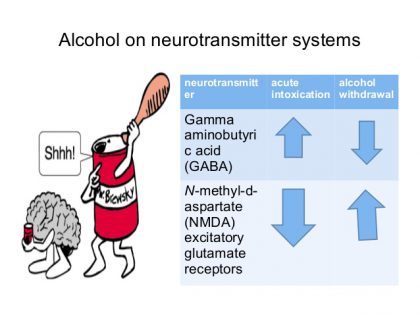
Addiction is a complex condition, and many other biochemical processes are involved in withdrawal symptoms. But in case you’ve been suspecting that you’re doomed or you’re losing your mind, it can be very helpful to be aware of the GABA/glutamate mechanism.
The following graphic may help you to grasp a fuller picture of the biochemistry involved:
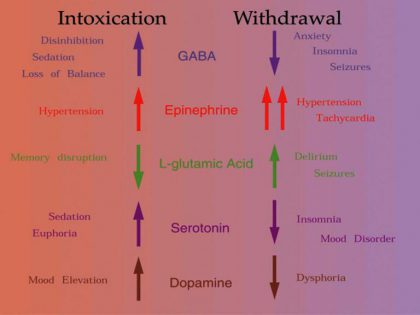
Alcoholism is not a sinister curse; it is a biochemical disorder that can be conquered.
Why Does It Get Worse Over Time?
Kindling is a phenomenon of brain chemistry for alcoholics. It basically means that episodes of withdrawal tend to get worse over time.
Due to kindling, I’ve experienced nearly every symptom of withdrawal listed in the first section, at one time or another.
In high school, I had a few scattered hangovers. These progressed to mild withdrawal symptoms when my tolerance increased in college. By the time I finished college, I experienced moderate symptoms if I went a few days without drinking.
In my mid-twenties, I could not take a week off of drinking without suffering some gray area between moderate and severe withdrawal symptoms. I had to call in sick to work whenever I wanted a “dry period” to begin. Eventually, my symptoms got so severe that I was left with no option but to get help.
The worsening of symptoms from episode to episode baffled me. Why couldn’t I go back to having simple hangovers or mild withdrawal symptoms?
The answer is that I had progressively greased the pathways of withdrawal in my own brain. With each alternating period of drinking, withdrawal, and dry time, my brain’s compensatory manipulation of GABA and glutamate became more exacerbated.
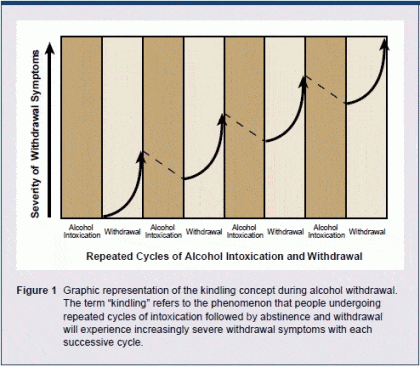
Moreover, scientists have found that each withdrawal experience permanently alters specific processes within our brains. (It is not necessary to understand these processes to grasp the concept of kindling.)
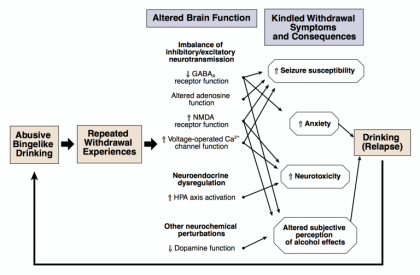
Studies in primates have found that animals with past withdrawal episodes suffered from more extreme symptoms in later episodes, even when they were given less alcohol than they had consumed in the past. (source)
Yet the average heavy drinker doesn’t decrease the amount of alcohol consumed over time. It’s no secret that alcoholics build a frighteningly high tolerance. This fact also adds to the severity of future withdrawal episodes.
So, why do addicts tend to escalate their drinking over time? One reason they drink more is because more drinking is needed to fill in for GABA, which becomes ever more scarce in their brains. Additionally, more is needed to suppress glutamate, which as mentioned before, causes feelings of stress that set in a few hours after drinking sessions end.
And so the alcoholic begins drinking more during each session and waiting less time in between sessions. Withdrawal episodes can go from “mild” to “severe” within the span of a few months. There are a few other reasons that withdrawal symptoms can get worse over time:
- Longer duration of drinking causes more brain and organ damage (detox becomes more physically difficult)
- Psychological dependence increases along with physical dependence (quitting becomes more mentally difficult)
It’s not uncommon for an alcoholic who swore never to drink in the morning to reluctantly begin taking a shot or two to ease withdrawal symptoms before work. It seems like a blur in retrospect, but luckily after reaching this point, I decided that it was time to let go of my pride and get help.
Conclusion
I hope that you’ve taken useful information from this guide. There is no way to pinpoint exactly how long your withdrawal symptoms will last, but the information presented can help you shorten your symptoms and maybe even change your life!
I want to finish up this piece with three of my favorite Tony Robbins quotes, which I think are relevant for anyone who is struggling during detox:
- “You feel what you focus on.” While you repair your system, don’t focus on the absence of alcohol in your life – focus ONLY on empowering and exciting dreams and alternatives to drinking.
- “Focus on where you want to go, not on what you fear.” Focusing on scary things like “relapse” can become a self-fulfilling prophecy. Write down your new life plan – and your goals for this week.
- “Emotion is created by motion.” If you feel horrendous, go for a jog – fix your posture – take deep breaths – take a cold shower – hold a plank for as long as you can – DO things that change your mental state in the moment and add up to a brilliant transformation over time.
If you have any questions, please leave them in the comment box below.

Authors
-
A decade+ addiction-free, Chris Scott, the visionary founder of Fit Recovery, passionately guides Fit Recovery 2.0 Members toward a vibrant, healthier lifestyle. Through the integration of groundbreaking nutritional strategies, transformative reframing techniques, neurolinguistic programming, and dynamic pro-recovery habit systems, he inspires individuals to boldly take charge of their lives and break free from alcohol. Chris is celebrated as a Professional Member of the Alliance For Addiction Solutions. Moreover, he is the proud author of the bestselling book "Drinking Sucks!" which stands as a vital beacon of hope for those yearning to quit drinking. Additionally, he created the celebrated online program Fit Recovery 2.0, designed to provide unwavering support for individuals embarking on their recovery journey.
View all posts Fit Recovery Founder & Director -
Dr. Ken Starr is board certified in both Addiction Medicine and Emergency Medicine, and diplomate of the American Board of Addiction Medicine. In addition to his work as the Addiction Medicine Director for Fit Recovery, he operates Ken Starr MD Wellness Group in Arroyo Grande, CA. His clinic offers advanced drug and alcohol detox methods, long term recovery facilitation, and IV nutritional programs including NAD+ therapy.
View all posts



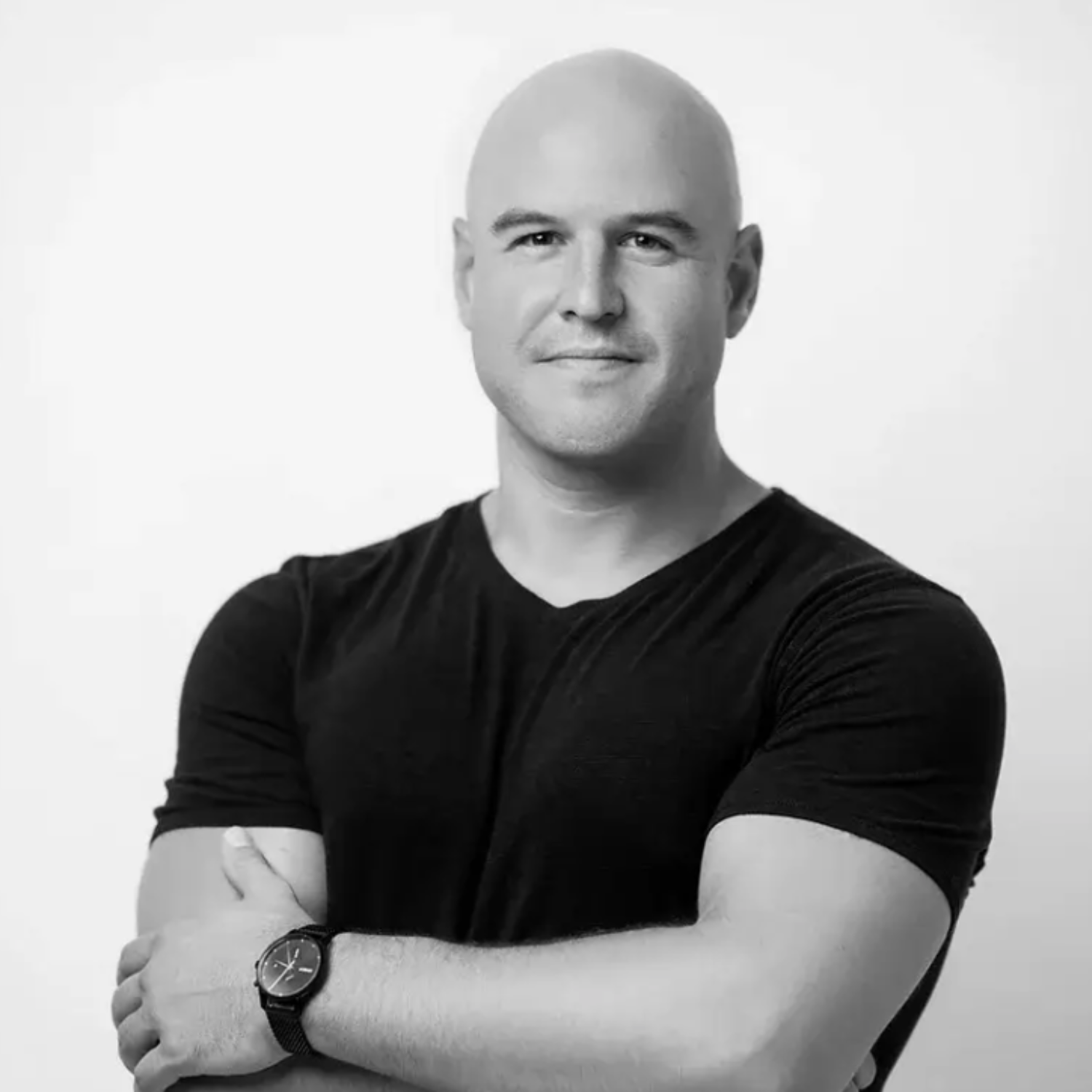




This was great info and concise! Thank you. In recovery for over a year but this resonates more than a lot I’ve read
My son is experience withdrawal now he has no insurance or can’t work he’ll quit for a awhile but the gets money and can’t stop I’m trying to help him detox at home I am tapering him off he can’t eat at all I have no money to put him in rehab. He has been down this road alot for yrs. Sober up the drink till he’s broke the we start the detox. What can I do to help him.
My x partner is an alcoholic of heavy drinking 20 years. He moved in with his parents a few months ago and became very sick. He was hospitalized 3 days and has been in a state of confusion over 2 weeks now. His parents won’t even tell him he stopped drinking. He is almost like in constant flashbacks and I am afraid for him. No one knows why he is so confused, even doctors. He was forced into cold turkey detox and I’m afraid he won’t come out of this.
Hi Lynn, cold turkey detox is never a good idea for heavy chronic drinkers. Hopefully the doctors are giving him enough thiamine to prevent brain damage. Of course, I am not a doctor, and so I can’t comment on his specific medical circumstances. Best of luck to you both.
Hello,I’m in week two of tapering from 8-9 beers a day for the last 20 years to 2 and eventually none and I have been so confused it’s scaring me and my wife.I’m functioning at work but I’m extremely confused at times.I’m just wondering if this is normal.I’m taking a B1 complex supplement and vitaminD also.Thank you for time.
Hi Jay, this is definitely normal and I know how this feels. B vitamins and vitamin D are good, but you might benefit from other supplements like magnesium citrate and DLPA. A solid multivitamin like Legion Triumph can also help. Best of luck to you.
Hi there. I am currently sitting up at 1:15 in the morning unable to calm my nerves. I’ve began a tapering (used to drinking 8-10 glasses of wine per day). Monday I had way too much to drink watching football. Yesterday I had 5 glasses of wine after getting home from work. Had severe anxiety and could not sleep until probably 4am (ended up taking a 1/4 of a Xanax just to calm down which I did and got some sleep. Tonight I’ve only had 3 glasses of wine and I am having anxiety, nervousness, and restlessness. I ended up… Read more »
Hi Charity, this article might help you if your goal is to detox from alcohol at home. There are also supplements that can help relieve your symptoms and balance your brain chemistry.
For further guidance, check out my online course or coaching packages. Best of luck to you!